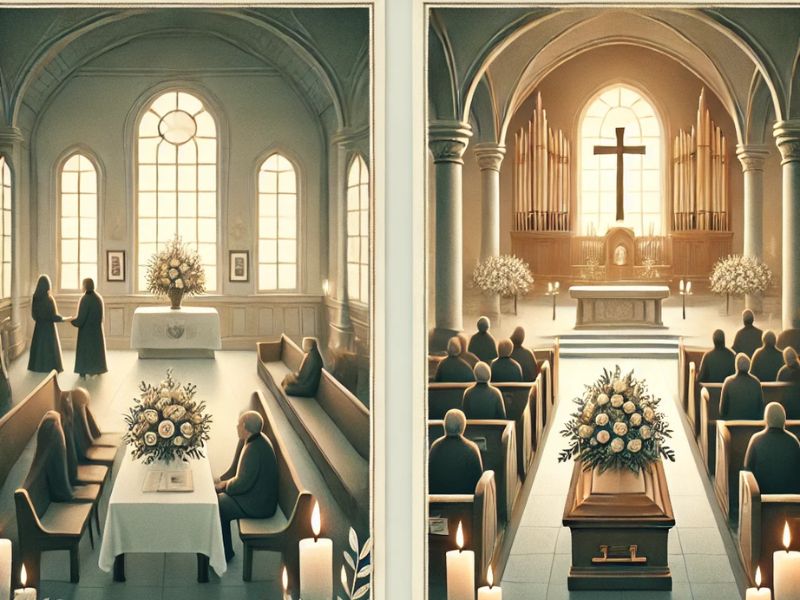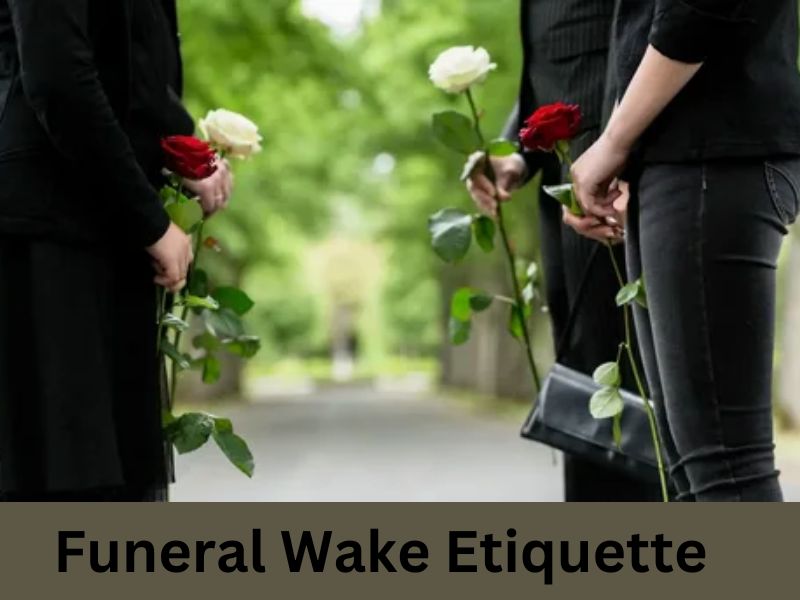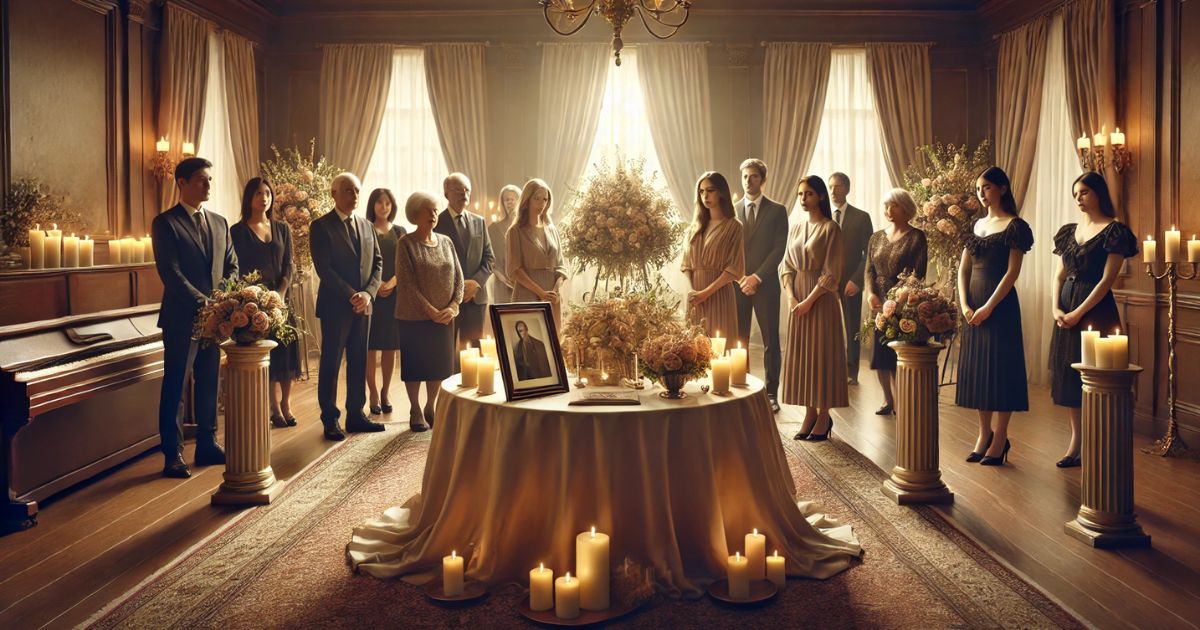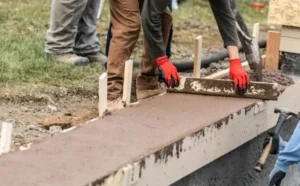A funeral wake is a deeply significant event where family, friends, and the community gather to both mourn and celebrate the life of a loved one who has passed away. Rooted in history and cultural traditions, a wake is much more than a formal ceremony—it’s a space to share memories, offer support to the bereaved, and find a sense of closure.
Whether you are planning or attending a wake, understanding the balance between proper etiquette and heartfelt expression is essential. From learning about traditional customs to embracing modern practices, a wake serves as a valuable guide to honoring the deceased.
This article offers insights to help organize a thoughtful wake, ensuring that every detail—from offering support to the bereaved to adhering to religious and cultural considerations—comes together to create a meaningful farewell.
Modern-Day Funeral Wakes
Today, the concept of a wake has evolved to suit more modern, relaxed, and social gatherings while still honoring the life of the deceased. While some families may choose to hold a vigil, many prefer settings that reflect their personal wishes.
These gatherings often include food and drink, making it easier for the family and community to come together in comfortable and welcoming venues. Whether hosted in a home, a community hall, or even a local pub, the atmosphere can be tailored to be somber and reflective or celebratory, depending on the preferences of the deceased and their loved ones.
In some cases, as seen in the Irish tradition, the sense of the word “wake” takes on a vibrant meaning, blending laughter, stories, and togetherness. While these wakes often take place after a funeral service, the discretion of the family allows for creativity in how the gathering unfolds.
Understanding a Funeral Wake
A funeral wake is a gathering that takes place either before or after the funeral service and serves as a time for family and friends to come together. Traditionally held in the home of the deceased, wakes provided an opportunity to keep vigil over the body while offering prayers.
Families often choose to organize the event with a blend of cultural traditions and personal touches, such as planting a memorial tree or sharing food and drink. Whether simple or elaborate, a wake allows attendees to honor the deceased and offer support to the bereaved.
Understanding the Difference Between a Wake and a Funeral

Funeral
A funeral is a formal event that is typically led by a celebrant or religious figure and follows a structured order of service. It is often guided by specific rites and rituals, making it a solemn occasion dedicated to honoring the life of the person who has died.
The focus is on reflection, prayers, and saying goodbye within the context of cultural or religious traditions.
Wake
In contrast, a wake is more casual and focuses on mourners coming together, remembering the life of the deceased, and sharing moments of comfort and connection. Wakes allow for flexibility, offering a relaxed space for storytelling, laughter, and even quiet moments of reflection.
Both events serve unique purposes, but the wake is a more informal gathering that emphasizes unity and shared memories of the person who has passed.
The Historical Origins of Wakes
The concept of a wake has its origins in ancient customs, with the word itself deriving from Old English “wacan,” which means “to wake” or “to keep watch.” Historically held in the home of the deceased, wakes brought family members and friends together to gather around the body for several days and nights before the burial.
This time of vigil was often accompanied by prayers, storytelling, and ritual mourning, providing a shared space for grief and reflection.
In Ireland, the tradition of the wake is particularly notable, blending somber moments of prayer with celebratory aspects such as sharing food, drink, and recounting stories about the deceased’s life.
This blending of grief and celebration continues to influence how wakes are conducted today, with families choosing to celebrate their loved ones in both reflective and joyous ways.
Planning a Funeral Wake: Key Steps and Considerations
From selecting a location to setting up food, beverages, and memorial activities, planning a wake entails a number of crucial choices. The essential procedures for planning a dignified and significant funeral wake are broken down in detail below.
1. Choosing the Right Venue for the Wake
Planning a wake requires thoughtful decisions to ensure the event honors the deceased while being meaningful and respectful to the family and mourners. The first major step is choosing the right venue, which can set the tone for the entire gathering.
Traditionally, wakes were held in the home, but modern settings offer more flexibility. Consider family preferences, the number of attendees, and the desired atmosphere, whether formal or casual. Options include funeral homes with dedicated spaces, community halls, or even hotels and pubs for larger groups.
Religious settings such as churches or synagogues can also provide a suitable environment for reflection and support.
When selecting a venue, keep these key factors in mind:
- Capacity: Ensure it accommodates all guests comfortably.
- Accessibility: Make it easy to access for elderly or disabled attendees.
- Atmosphere: Choose a setting that matches the event’s tone and includes a personal touch to make the gathering special.
2. Deciding on Catering and Refreshments
Providing food and drinks at a wake is a traditional element that allows attendees to share a meal, relax, and connect in an informal setting. Thoughtful catering gives an opportunity to tailor the menu to cultural and personal preferences.
You can choose light refreshments such as tea, coffee, sandwiches, or pastries, which are perfect for smaller or more informal gatherings. For a buffet-style arrangement, consider cold meats, salads, bread, and desserts, especially if the event lasts for a longer period.
A potluck-style setup where guests bring dishes is also popular in some cultures and communities, fostering a sense of togetherness.
Tips for planning the catering:
- Offer dietary options like vegetarian, vegan, and allergy-friendly choices.
- Keep it simple for smaller gatherings, or opt for elaborate spreads for larger groups.
- Be mindful of timing and the timeline—guests may appreciate light refreshments after the funeral service.
For wakes inspired by Irish traditions, including whiskey, beer, or other alcohol may add a personal touch. Thoughtful food and drink choices can make the gathering comforting and memorable for everyone.
3. Setting the Wake’s Timeline
The duration and schedule of a wake can vary depending on the family’s preferences, customs, or culture and religion. Generally, a wake lasts between two to four hours, but it can extend longer, especially in the evening before a funeral.
Planning a clear timeline helps ensure the event runs smoothly and allows guests and attendees to feel welcome. From the arrival of guests to the closing, every moment should create opportunities for comfort, remembrance, and connection.
Key elements to include in the wake’s timeline:
- Arrival of Guests: Welcome attendees and allow them to offer condolences to the bereaved family.
- Opening Remarks: A family member or close friend can say a few words to set the tone.
- Viewing of the Body (optional): If desired, the body can be present for reflection.
- Sharing Stories: Include moments for guests to share memories, or set up a photo slideshow or memory book.
- Refreshments: Food and drinks can be served during the session to encourage mingling.
- Closing Gesture: End with a meaningful prayer, song, or symbolic act before guests leave at their own pace.
4. Adding Personal Touches to the Wake
A wake is a valuable opportunity to celebrate the unique personality and life of the deceased. Adding personal touches makes the event more meaningful and creates a memorable experience for families and attendees.
Ideas for personalizing the wake:
- Memory Tables: Include photo albums, memorabilia, and symbolic items to honor the deceased.
- Tribute Videos: Create a slideshow or montage of moments from their life, accompanied by meaningful music.
- Storytelling Sessions: Encourage guests to share stories, anecdotes, or words of remembrance through an open mic or written messages in a memory book.
- Flowers and Notes: Allow guests to leave notes or flowers as symbolic tributes.
These thoughtful elements help create a touching farewell that resonates with everyone present.
Understanding Funeral Wake Etiquette: What to Know as a Guest

If you’re not familiar with the traditions or expectations, attending a wake may feel strange or uneasy. Here is a guide to proper wake etiquette to help you handle the situation with tact and dignity.
1- Dressing Properly for a Funeral Wake
For many, attending a wake can feel unfamiliar or uncomfortable, especially if you are unsure about customs or expectations. Following an appropriate dress code shows sensitivity and respect for the occasion.
Funeral attire often requires dressing conservatively in dark, muted colors like black, navy, or grey, avoiding bright or flashy clothing unless the family requests a style that reflects the personality of the deceased.
Key considerations for wake attire:
- Men: Wear suits, slacks, a collared shirt, and a tie.
- Women: Choose dresses, skirts, or blouses with a sweater for a modest appearance.
- Cultural Exceptions: Some cultures use white to symbolize celebration rather than mourning.
Keep it simple and align your outfit with the family’s preferences to show thoughtful etiquette. This helps create a respectful atmosphere and makes navigating the event easier for all.
2- Offering Comfort Through Condolences
Offering condolences is one of the most important aspects of attending a wake. It allows you to show support to the family of the deceased by expressing sympathy or sharing a memory. A simple, heartfelt, and concise message can go a long way in providing comfort during a difficult time.
Take a moment to greet the guests and the family, offering your words with warmth and respect. Sometimes, a physical gesture, like a handshake or a hug, can add an extra layer of support if the family is comfortable with it.
Examples of what to say:
- “I’m so sorry for your loss.”
- “Your [loved one] was a wonderful person who will be truly missed.”
- “I will always remember the time [share a memory or moment].”
These small acts of kindness create meaningful connections and help those grieving feel supported.
3- Taking Part in Wake Activities
At a wake, guests are often invited to participate in various activities that bring comfort to the bereaved and honor the deceased. These may include sharing a story, viewing photo albums, or contributing to a memory book.
Even if you’re not comfortable speaking publicly, you can still show support by listening to others, engaging in reflection, and offering a kind word. It’s important to be mindful of the event’s tone, which may be solemn or celebratory, depending on the family’s preferences.
Ways to participate during a wake:
- Share a story or meaningful memory about the deceased.
- Look through photo albums or add a message to the memory book.
- Offer a supportive presence by simply listening and being there for the family.
- Follow the family’s lead and respect their wishes for the gathering.
These small acts of kindness can provide immense comfort to those grieving and help create a warm and supportive environment.
How Funeral Wakes Vary Across Cultures and Religions
Many cultures and faiths have wakes as part of their traditions, although the practices that surround them might differ greatly. Here are a few instances of wakes held in various cultural and religious contexts.
1- Christian Funeral Wakes
Christian traditions around wakes focus on creating a time for families and loved ones to gather before or after the funeral service. In many cases, the body of the deceased may be present in a coffin, and the event includes prayers or religious readings that are often recited.
Depending on the family’s preferences, these gatherings can be formal or informal, but they always aim to provide support to the bereaved and an opportunity for reflecting on the life of the departed.
Catholic Wakes
Catholic wakes, in particular, are traditionally held in the evening before the Funeral Mass. They may include rosaries, hymns, and blessings offered by a priest. These elements create a comforting and spiritual space for attendees to honor the deceased while finding solace in shared faith.
2- The Tradition of Irish Wakes
Irish wakes are well-known for their unique blending of mourning and celebration. Traditionally, the body of the deceased is laid out in the family home, where friends, neighbors, and relatives gather to pray, share stories, and offer condolences.
These events often include food, drink, and sometimes alcohol, creating an atmosphere where grief and joy coexist. Music, singing, and songs are also integral, making the event both reflective and uplifting.
Irish wakes can last for several days, culminating in the funeral Mass. Notices may say the deceased is “lying in repose,” indicating the presence of the body, often in an open casket.
It’s common for someone to sit with the body at all times, ensuring the departed is never alone. This heartfelt tradition provides a meaningful way to honor the deceased while bringing loved ones together.
3- The Practices of Hindu Wakes
In Hindu tradition, wakes are deeply spiritual and centered on rituals and prayers to guide the soul on its journey to the afterlife. These ceremonies often involve incense, chanting, and offerings to deities. The body is typically cremated within 24 hours of death, making the timeline swift and purposeful.
After the cremation, a wake-like gathering may take place where the family, along with visitors and guests, can share their grief and extend condolences.
The rituals performed during a Hindu wake highlight the connection between the spiritual and the physical, offering comfort to those present while honoring the deceased’s transition into the afterlife.
4- The Traditions of Buddhist Wakes
Buddhist wakes emphasize peace and reflection, focusing on meditation and prayer to honor the soul and its path toward rebirth. These ceremonies often include chanting led by monks or family members, creating a serene atmosphere.
Offerings such as food, flowers, and candles are made to show respect and honor the deceased while fostering a spiritual connection.
Guests are encouraged to meditate or quietly reflect on the life and virtues of the deceased, helping everyone feel a sense of calm and purpose. This balance of mindfulness and ritual ensures the wake is a meaningful moment for the family and all who attend.
Practical Tips for Planning a Thoughtful Funeral Wake
Organizing a wake requires careful planning to ensure the event appropriately honors the deceased while providing comfort and support to all attendees. A wake is a special time to bring people together, and paying attention to details can make it meaningful for everyone involved.
Start by considering the preferences of the family, including the venue, atmosphere, and any personal touches that reflect the life of the deceased.
Here are some practical tips to help guide the process:
- Choose a setting that allows people to feel at ease and share memories comfortably.
- Include elements that honor the deceased, like photo displays or memory books.
- Make arrangements for food or refreshments to support guests during the gathering.
These thoughtful steps will help create an atmosphere that brings both comfort and support to those in attendance.
1- Setting a Budget for a Funeral Wake
The cost of wakes can vary widely, depending on the venue, catering, and the number of guests. It’s important to establish a budget early and make decisions that align with the family’s financial resources.
Whether the wake is a simple and heartfelt gathering or a more elaborate event, careful planning ensures that it honors the deceased without unnecessary expenses.
Consider options that fit your needs, such as hosting at a home for a more intimate setting or choosing a rental venue for larger gatherings. Keep catering costs manageable by offering light refreshments or a small buffet.
2- Sharing Responsibilities to Ease Planning
Organizing a wake can be emotionally and physically draining, especially for the bereaved family. To make the process smoother, it’s important to delegate tasks to trusted members or friends.
Assign roles like coordinating the venue, arranging catering, or sending invitations, allowing the immediate family to focus on grieving and receiving support from their loved ones.
By sharing responsibilities, the planning becomes less overwhelming. A collaborative approach ensures that every detail is addressed while giving the family the time and space they need.
3- Creating a Special Memory Table
A dedicated memory table can add a meaningful element to the event, providing a quiet space for reflection and remembrance. Setting up a table where guests can leave notes, display photos, or share personal tributes to the deceased makes the wake more heartfelt.
This simple yet powerful addition allows attendees to connect with the memories and legacy of the person being honored.This memory table can become a central point during the wake, offering everyone a chance to pause and reflect while creating a collective tribute to the departed.
4- Including Digital Participation
For guests unable to attend the wake in person due to distance or other constraints, providing a virtual option can ensure they are still part of the gathering. Live-streaming the event or setting up a digital memory board allows attendees to leave messages or share tributes online.
This inclusive approach ensures that everyone, regardless of location, can honor the deceased and connect with others in a meaningful way.
Creating a digital memory board also offers a space for sharing memories and comforting words. These platforms can serve as a lasting tribute, enabling guests to engage and participate in ways that feel personal and heartfelt.
5- Adding Cultural or Religious Traditions
Incorporating religious or cultural traditions into a wake can make the event more meaningful and authentic for the family and guests. Honoring the deceased by including relevant customs, such as prayers, rituals, or symbolic acts, helps create a connection to their beliefs and values.
These traditions often serve as a source of comfort, reflecting the spiritual or cultural practices that were significant to the person’s life.
For example, including specific prayers or performing symbolic gestures can make the event feel deeply personal. These thoughtful touches not only honor the deceased but also bring people together in a shared act of remembrance, creating a space where love and respect take center stage.
The Importance of a Well-Planned Funeral Wake
A funeral wake provides a vital space for mourning, remembrance, and the celebration of a loved one’s life. Whether grounded in cultural traditions or adapted to modern preferences, it creates an opportunity for the community to come together to support the bereaved and honor the memory of the deceased.
A well-planned wake reflects the spirit and personality of the person who has passed, offering comfort and connection to those in attendance.
Thoughtful planning is key to organizing a wake that leaves a lasting tribute. By carefully considering the venue, catering, and timeline, and adding personal touches, families can ensure the event truly celebrates a life well-lived.
Paying attention to detail transforms the wake into a moment of shared reflection, love, and respect, leaving everyone with a meaningful way to say goodbye.
FAQs
What is the purpose of a wake?
A wake provides a space for family, friends, and the community to gather, mourn, remember the deceased, and offer support to the bereaved.
What’s the difference between wake and funeral?
A wake is often more casual, focused on sharing memories and gathering together, while a funeral is a formal ceremony with specific rituals to honor the deceased.
What is after a funeral wake?
After a wake, guests typically leave at their own pace, and some families may hold a private gathering or reflection time.
How long do you stay at a wake?
Staying for 30 minutes to an hour is common, but guests can stay longer if they wish to pay their respects or connect with the family.
Conclusion
A funeral wake is a meaningful way to honor the deceased and provide comfort to those grieving. Whether formal or casual, it allows loved ones to come together, share memories, and find solace during a difficult time.
More Posts:








